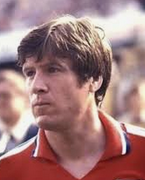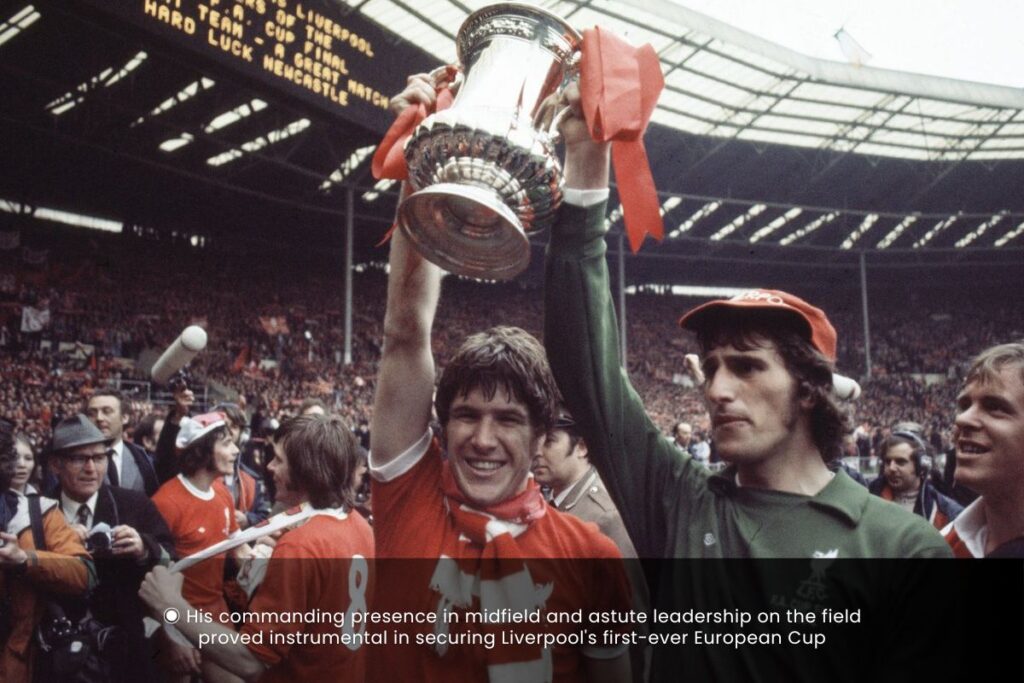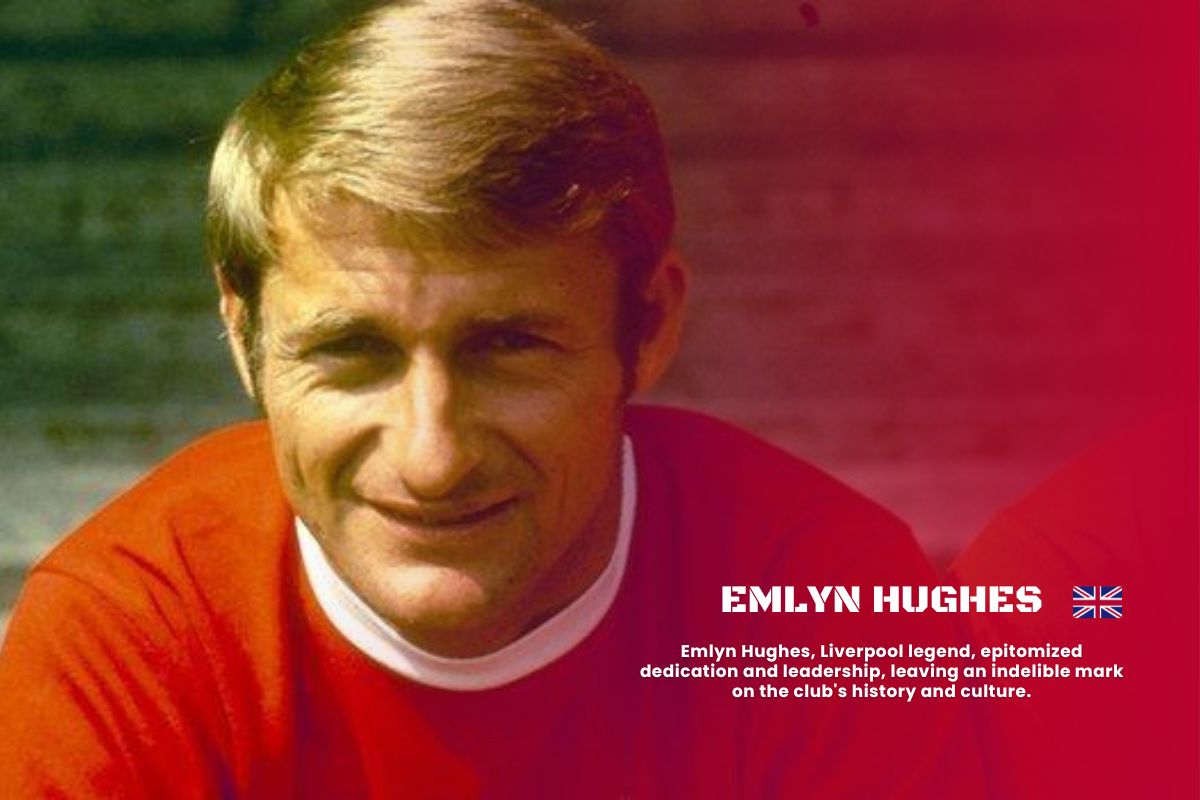
- DOB/Age: 28th August 1947; Demise – 9th November 2004
- Nationality: British
- Height: –
- Position: Midfielder
- Signed/Debut: £65,000, February 1967
Emlyn Hughes left an enduring legacy during his time at Liverpool FC, captivating fans with his unwavering dedication and leadership on the field. From his arrival in 1967 under the guidance of manager Bill Shankly to his departure in 1979 during Bob Paisley’s tenure, Hughes played a pivotal role in the club’s success. With three league titles, an FA Cup triumph, and European glory, including two European Cups, his impact is undeniable. Join us as we explore Hughes’ remarkable journey, celebrating his achievements and contributions to the iconic club.
Early Life and Career
Emlyn Hughes, born in Barrow-in-Furness, hailed from a family with a rich sporting heritage, with his father, Fred Hughes, excelling in rugby league football. Despite being initially denied a trial by his local side, Barrow, Hughes found his footing at Blackpool’s First Division team. Making his debut in 1964, he quickly showcased his versatility, initially playing as an inside forward before transitioning to left-half.
In 1967, Hughes made a significant leap to Liverpool FC, joining the ranks under the guidance of manager Bill Shankly. His early years at Liverpool saw him adapt to the demands of the club during a transitional period, earning recognition for his tenacity and versatility on the field. Despite facing challenges along the way, Emlyn Hughes’ determination and talent paved the path for a remarkable career ahead.
Career at Liverpool
Emlyn Hughes epitomized versatility and tenacity during his illustrious spell at Liverpool, earning admiration from teammates and coaches alike. Revered for his boundless energy and tactical acumen, Hughes left an indelible mark on the club’s tactics. Ian Callaghan, a fellow Liverpool legend, lauded Hughes, pointing to him as a player who excelled in any position he was deployed.
As a midfielder, Hughes formed formidable partnerships with teammates such as Tommy Smith, Kevin Keegan, and Ray Clemence, enhancing Liverpool’s dynamism and cohesion on the field. Manager Bill Shankly, a composer of motivational quotes, often relied on Hughes’ leadership and adaptability, citing his “heart of a lion” and “brain of a general.”
One memorable instance of Hughes’ on-field influence occurred during a crucial match against formidable opposition. With Liverpool trailing, Hughes rallied his teammates, orchestrating tactical adjustments that led to a remarkable comeback victory. His ability to inspire and galvanize the team cemented his legacy as a revered figure in Liverpool’s storied history.
Achievements, Moments, and Performances
As the first Red’s captain to lift the European cup, Emlyn Hughes’ legacy at Liverpool FC is etched in the annals of football history, marked by a plethora of memorable moments and match-winning performances that solidified his status as a true icon of the game. One of the standout achievements in Hughes’ career was his pivotal role in Liverpool’s European conquests, particularly the historic European Cup triumphs.
One of the most memorable matches featuring Hughes occurred during the 1977 European Cup Final against Borussia Mönchengladbach in Rome. As the captain of Liverpool, Hughes led by example, inspiring his teammates to a resounding 3-1 victory. His commanding presence in midfield and astute leadership on the field proved instrumental in securing Liverpool’s first-ever European Cup, a momentous occasion that will forever be etched in the club’s folklore.

Hughes’ ability to perform in crucial situations was exemplified by his remarkable performance in the 1974 FA Cup final against Newcastle United. With Liverpool aiming to clinch the prestigious trophy, Hughes delivered a masterclass display, marshaling the midfield with authority and scoring a crucial goal to help his team secure a comprehensive 3-0 victory. His standout performance propelled Liverpool to FA Cup glory and showcased Hughes’ unparalleled talent and determination on the grandest stage.
Furthermore, Hughes’ leadership and resilience were evident in his record-breaking achievements at Liverpool. His unwavering commitment to the club saw him become Liverpool’s most-capped player at the time, earning a remarkable 665 appearances and scoring 49 goals. Hughes’ enduring impact on Liverpool’s success was further exemplified by his inclusion in the prestigious Liverpool FC poll “100 Players Who Shook The Kop,” where he was voted No.10.
Emlyn Hughes’ contributions to football were duly recognized when he was appointed Officer of the Order of the British Empire (OBE) in the 1980 New Year Honours. Additionally, his induction into the National Football Museum’s Hall of Fame in 2008 served as a testament to his enduring legacy and profound influence on the sport.
Legacy and Impact
Emlyn Hughes’ legacy at Liverpool FC extends far beyond his on-field accomplishments, leaving an indelible imprint on the club’s history and culture. As a charismatic and influential figure, he inspired countless younger players with his tenacity, versatility, and unwavering commitment to excellence. His enduring impact is evident in numerous awards and accolades he received, including being voted No.10 in the official Liverpool FC poll “100 Players Who Shook The Kop” and his induction into the National Football Museum’s Hall of Fame.
Beyond the realm of football, Emlyn Hughes philanthropic endeavors, such as the cancer support charity run in his name, further underscore his profound influence and enduring legacy, ensuring that his memory continues to inspire generations of Liverpool fans and football enthusiasts worldwide.
Life after Liverpool and Personal Life
After departing Liverpool in 1979, Emlyn Hughes continued his football journey, showcasing his leadership both on and off the pitch. He joined Wolverhampton Wanderers, where he lifted the League Cup as captain in his first season. Hughes later ventured into management, serving as player-manager for Rotherham United, before brief stints at Hull City and Mansfield Town. Post-retirement, Hughes remained actively involved in football, notably as a team captain on the BBC quiz show “A Question of Sport” and as a pundit for various television networks.
Emlyn Hughes dedicated himself to charitable endeavors, including his involvement with cancer support charities and the Freemasons of Tapton Masonic Hall in Sheffield. His contributions to society were recognized with an Officer of the Order of the British Empire (OBE) honor in 1980 for his services to football. In his personal life, Hughes was a devoted family man and found joy in his roles as a husband and father. His legacy as a footballing icon and philanthropist continues to inspire and uplift communities to this day.
Conclusion
Emlyn Hughes’ tenure at Liverpool FC epitomized dedication, leadership, and excellence. From captaining the team to European glory to becoming a revered figure in Anfield’s history, Hughes left an indelible mark on the club. His enduring legacy as a footballing icon and philanthropist continues to resonate with fans worldwide. As a true legend of Liverpool FC, Hughes’ place in the club’s storied history remains unshakeable, serving as an everlasting source of inspiration and pride.
Read all other posts on Emlyn Hughes
Find the Latest News on Player Ratings | Transfers | Prematch | Postmatch
Stay tuned for more updates on Liverpool FC Times and Stories. Your thoughts are always welcome in the comments section. Thank you for your continued support!
YNWA (You’ll Never Walk Alone)!
The Liverpool FC Times Team
LiverpoolFCTimes.com
